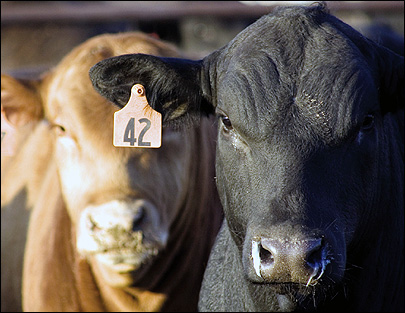
Agricultural News
U.S. Meat Export Federation Releases Livestock ID Economic Assessment
Mon, 26 Sep 2011 11:16:21 CDT
 A study assessing the impact of traceability and animal identification programs on the international market for red meat has been released by the U.S. Meat Export Federation (USMEF).
A study assessing the impact of traceability and animal identification programs on the international market for red meat has been released by the U.S. Meat Export Federation (USMEF).
Conducted by researchers at Kansas State University, Colorado State University and Montana State University, the study assesses the potential impact on U.S. producers and processors of evolving thinking about animal ID and traceability in leading export markets and traceability systems that have already been put in place by other major beef and pork exporting countries.
The study "Economic Assessment of Evolving Red Meat Export Market Access Requirements for Traceability of Livestock and Meat" points out that the United States and India are the only two major beef exporters that do not already have mandatory traceability systems. Argentina, Brazil, Australia, New Zealand, Canada and Uruguay all have animal identification/traceability programs in place.
In addition to the traceability systems of exporting nations, the report, which was commissioned by USMEF on a contract awarded based on a request for proposal, provides an analysis of the domestic cattle traceability systems employed by selected major importers of U.S. beef. Of special note, Japan and Korea, among the highest value markets for U.S. red meat exports, have adopted mandatory traceability programs which could eventually lead to similar requirements being applied to imports.
Finally, the report compares the sanitary and phytosanitary restrictions imposed on the major beef exporters by the top importing countries. For some exporting nations, such as Australia and New Zealand, there are no restrictions imposed by trading partners. Brazil and Argentina face FMD (foot and mouth disease)-related restrictions and traceability systems are critical for exports from these South American countries which are not entirely free of FMD.
The United States faces BSE-related product and age restrictions from a number of major importing countries (Japan, South Korea, Taiwan, Hong Kong, Russia and Mexico) as well as restrictions from the European Union based on hormone use. In addition, China's beef market remains closed to imports from the United States due to BSE-related restrictions.
The report notes that competing beef exporting nations are using their industries' mandatory traceability systems as marketing tools to enhance their sales and as a point of differentiation with the U.S. industry.
While market access and producer profitability have been important factors in exporting countries' decisions to establish traceability systems, the report concludes that animal health management and food safety are the primary drivers behind most countries' decisions to build animal ID and traceability into the regulatory frameworks for their livestock industries. Improved supply chain coordination and enhanced producer management opportunities are secondary motivators.
"The most widely recognized international animal health, food safety, and trade organizations have endorsed animal ID programs as essential components of food animal production and meat product trade. In response, major beef exporters and importers have developed mandatory animal ID and traceability systems," the report states. "As more countries adopt animal and meat tracking systems, those early adopters of livestock and meat traceability systems have the opportunity to gain significant market advantages through increased consumer confidence.
"Countries with well-developed mandatory animal identification and traceability programs enjoy comparative advantages in red meat exports relative to countries without such systems," the researchers add. "They are better positioned to respond quickly to crisis situations and mitigate potential damages."
The value of the research report was emphasized by Leann Saunders, president of IMI Global, a member of USMEF's executive committee and chairperson of the USMEF working group on traceability.
"When you first consider the value of the export market to U.S. cattle and hog producers, with export value this July equating to $236.88 per head of fed cattle harvested and $59.35 per head for hogs there is no denying the importance of exports for U.S. producers," said Saunders. "As we have seen in the beef industry engaged in voluntary USDA PVP and QSA verification programs for countries like Japan and the EU countries that have export verification requirements specific to animal identification and traceability it can work effectively. Since we are currently exporting about 16 percent of total U.S. beef and variety meat production and 29 percent of pork, traceability is a form of insurance that would insulate American producers in the event that importing countries change their import requirements or in the event of an animal disease outbreak."
Funding for the research report was provided by the USDA Market Access Program (MAP).
Click here for the full research document.
Click here for the USMEF Research Recap on this study.
WebReadyTM Powered by WireReady® NSI
Top Agricultural News
More Headlines...




















